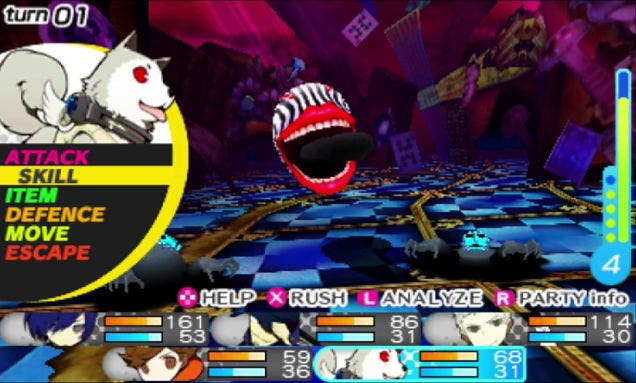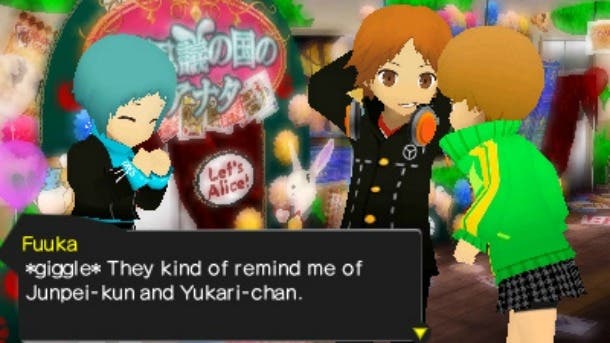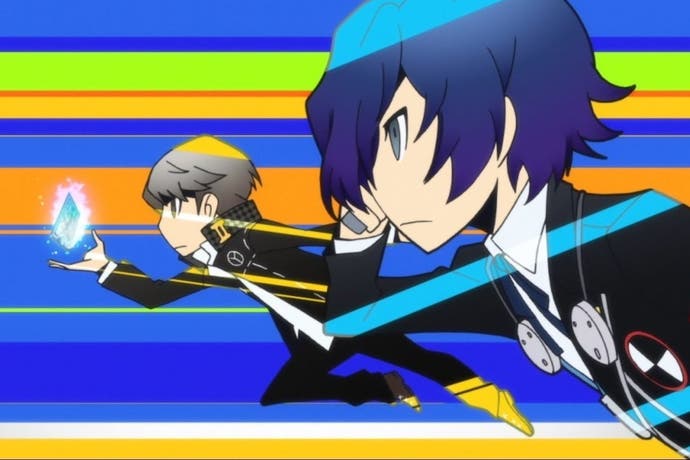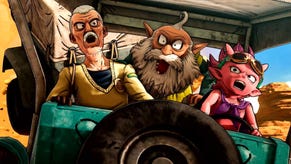Persona Q review
Back to schooling.
While Persona Q's aesthetic is that of a Saturday morning anime cartoon series, all screaming colours and staccato dialogue, the game's core kernel of appeal is found in Greek myth. Like Theseus descending into the labyrinth in search of the Minotaur, you too must carefully chart your path through the complicated warren of corridors and chambers that form the game's gargantuan dungeons. Unlike Theseus, who used a ball of thread to lead him back to the exit, here your tool is a paper and pencil (or, more accurately, a touchscreen and stylus) onto which you draw the layout of the game's multi-tiered dungeon. Square by square you record the walls, doors, secret passageways and treasure chests in a curiously compelling act of digital cartography.
While Theseus carried only a short sword for defence, here the gaggle of questing schoolchildren under your command and care are armed with swords, claws, axes, guns and, of course, the titular persona, Freudian spirits who provide devastating spectral back-up. Despite the warm camaraderie of this cast of students (most of whom are drawn from the third and fourth games in the Persona series, Atlus' popular series of ethereal high-school thrillers) it's the joy of cartography that keeps you pressing deeper. You have a slew of tools at your map-making disposal including arcane symbols and a rich palette of colours which can be applied for whatever purpose you choose. You draw the map onto a gridded sheet that remains ever present on the 3DS touchscreen and you must own any mistakes you make: draw in an errant wall or doorway where there is none in reality and you will curse your blunder later, as it misleads and causes you to doubt the chart on which you rely.

As you move around the dungeons (which are viewed from a first person perspective, allowing you to take stock of your surroundings and pick out corridors and walkways) each floor tile you walk across is automatically filled in on the map. The game reports the percentage of tiles that you've touched; collect every floor tile on a level and you're rewarded with a treasure chest that contains an often-crucial item. In this way Atlus turns territory into a collectible and, as any Monopoly player or empire-minded despot knows, territory is the very best kind of collectible.
Map-making might seem like a secondary feature in a game that tells a long and winding story, and which presents a complicated battle system that allows for both player expression (in terms of selecting your party members, their equipment and the personas they wield) and mastery (selecting the most efficient offensive attack for each enemy is crucial if you don't want to keep exiting the labyrinth and returning to school in order to rest and refuel your party). But it is central, even if the emphasis is not Persona's own. In fact, the game's mechanics are broadly imported from another Atlus series, Etrian Odyssey, a template onto which the Persona myth, props and characters have been grafted.
It's a comfortable marriage, although Persona's convoluted storytelling and fondness for inter-character repartee is less palatable in the context of this spin-off, where the story is largely divorced from the action. The writers also assume that the player will be deeply familiar with the cast (you can play with the cast of either Persona 3 or 4 and in-game conversations change accordingly, at least until the two groups eventually converge) and so spends little time or care introducing each character. There's light-heartedness to the story that's missing from the more earnest mainline Persona games (one that's reflected in the more innocent 'chibi' art style). Those drawn to the style will be happy to spend the 30 plus hours with the characters, while those who have no tolerance for the shtick can skip cutscenes and fast-forward conversations with ease.

While Persona has been altered in some crucial ways, most of Etrian Odyssey carries across mostly intact. Even its 'F.O.Es', particularly challenging enemies who are visible on the map (and therefore avoidable), are replicated here. Likewise, common enemies attack unseen and at random. Each step that you take in the dungeon increases the likelihood of an attack, an anachronistic design that proves unexpectedly tolerable (perhaps because the battles are relatively infrequent). Puzzles further interrupt the rhythm of exploration and combat, and this concoction of to-dos makes every excursion into a dungeon a thrilling proposition.
As well as collecting territory, enemies and treasure tiles drop items, which can be used back at the school hub to increase the range of weapons, armour and items available in the shop. This dynamic gives the game the feel of a scavenger hunt, and the promise of better equipment is a strong draw back into the breach. So too is the opportunity to equip and improve not one but two personas for each character, with the secondary persona granting additional skills and upgrades, allowing for an unprecedented degree of customisation.
It's a generous game, broad and long and, while it's principally aimed at the series' fans, the mesh of interlocking systems ensures that its appeal runs deeper than cash-grab fan service. Arguably Persona strongest elements -- the consequential socialising, the ability to choose how you spend your time and thereby set the pace of the plot, the through-the-looking-glass wonder of experiencing something of life in a Japanese high-school, the run of a provincial town - are all absent. But they have been replaced by something almost as interesting and certainly as captivating: the joy of heading into the perilous wild in search of treasure, while drawing a map to lead you home again.









